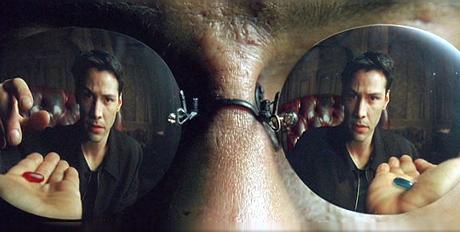In the context of aiki I had never heard the us of this term before. I usually have seen it in shooting arts. In kyudo 弓道 (way of the bow) 当たり or 当り Atari is the Ya (arrow) hitting the target.
Obviously in aikido it has nothing directly to do with the arrow - so we must delve further. Maybe though it is where the attention to connection is "shot". As I said, Endo's video was sadly deleted from youtube. The one artist that I have seen doing something similiar to Endo's work is from Kodokai. Here is a segment of the video of Daito Ryu Kodokai's Kodo Horikawa sensei. This level of connection he shows I feel is a great example of musubi/atari.

1: hit;
2: success;
3: guess; prediction;
4: affability; friendliness;
5: sensation; touch;
6: bruise (on fruit);
7: situation in which a stone or chain of stones may be captured on the next move (in the game of go);
8: bite (of a fish on a hook); strike; (Suffix)
9: per; each
This older form of this symbol, of course comes from China. The older version of the word looks like the following picture.

So looking at the characters this time did not really help illuminate the concept of atari 当たり. Fortunately a few sensei have already taken a crack at solving this riddle.
"Atari is a concept that's not as well known, at least in the West. My first introduction to this term was from Robert House sensei, from Aikido of Commerce. Robert trained with Endo sensei in Japan in the late 80's and said he made many references to "ateru", which I believe is a reference to "atari". Robert described this concept as similar to the feeling of fly paper. There is a stickiness that uke must strive for in order to feel the ki of nage. The connecting point where uke and nage meet is the atari point. Only by maintaining this point can center and ki be transmitted to one another. This is not to say that this point is fixed or static. It can move up and down your body, it can be maintained with the hands, arms, shoulders, hips, even the head. This connection point shifts and moves during practice and it keeps the two as one unified body."
Dan Dease
Head Instructor
Central Florida Aikikai
(Atari)"This means something like ‘to hit the mark’, ‘to catch’ (as in catching a fish with a line or rod). As I understand it, in Aikido it means taking control of your partner at the first instance of contact. This contact is first made through the point of contact – through the wrist, for example, with kata-te dori. This can only be achieved with completely relaxed shoulders and arms, but with a strong centre. The strength of your centre must radiate through your relaxed upper body."








Excellent post. Thanks.
ReplyDeleteYes... Contact with delivery of energy....
ReplyDeleteThere was a branch of SHINDO/SHINTO MUSO RYU that used the characters SHIN (ATARASHI) and TO (ATARI). There are usually translated as NEW JUST (probably from Hunter Armstrong's monograph, translating Matsui Kenji). I question the translation (since it doesn't make sense... NEW JUSTICE?) and wonder if NEW STRIKE or NEW UNDERTAKING (or even NEW SUCCESS) might be more appropriate to the meaning originally conceived. Ask me again in about 20 years.
ReplyDeleteThank you for this insight.
ReplyDelete